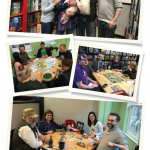
Image Credit: Sergey Peterman/shutterstock.com
James K. Smith, MD, believes in thinking several moves ahead. Consider your opponent. Gauge your strategy. Be aggressive when you need to be. Those are key aspects of his philosophy in rheumatology—and chess.
Initiation
Dr. Smith’s love of chess started after he had started his family. “I first got involved in the game through my daughter,” he says. “I coached her, along with a local master-level chess player. She ended up as the K–4 level Oregon state champion. Although she quickly lost interest in chess, I was hooked. I continued to take lessons from the same master. I started entering adult tournaments. He would critique my matches. We developed strategies and training programs, so that I would gradually improve.”
He found the competition invigorating, albeit sometimes a little frustrating when he thought his play could be better. “I had many upset victories over higher-rated players, and I had the ability to challenge players way above my level,” he says. “I was not very consistent, and I lost matches that I should have won, so my rating never got very high. I really enjoyed the intense competition and drama of tournament play. I would also follow the matches of the elite players. Like any good doctor, I enjoyed studying the game and improving my understanding of underlying principles of excellent play.”
Dr. Smith says he found chess made him a better rheumatologist. “Chess and medicine have a great deal in common,” he says. “Frequently, there is no right or wrong move, but some moves or decisions may be ‘stronger’ than others. Each move or decision will simultaneously lead to an improvement and a weakness. It is up to the doctor or player to decide if the improvement is worth the cost of the weakness. This is certainly the case in rheumatology. A new biologic agent will certainly lead to better control of rheumatoid arthritis, but at the cost of higher risk of infection. The modern rheumatologist needs to be well acquainted with registry data and evidence-based medicine. The patient also needs to be brought into this complex decision process.”

Dr. Smith
Dr. Smith chose rheumatology as his specialty when he worked in New York City at Metropolitan Hospital, where he gained an appreciation for preventive medicine and managing a patient over the long term. Assessing where the discipline was in the 1980s, he was fond of the emphasis on a good history and physical exam as opposed to labs and imaging.
Change of Scenery
Dr. Smith, who made a somewhat recent move to the University of Alabama-Birmingham School of Medicine after 17 years with Northwest Rheumatology Associates in Portland, Ore., starts his day by considering the patients he will see. He sees a good amount of new patients, spending extra time with them. A main tenet of his philosophy? Be readily armed with knowledge for them.


